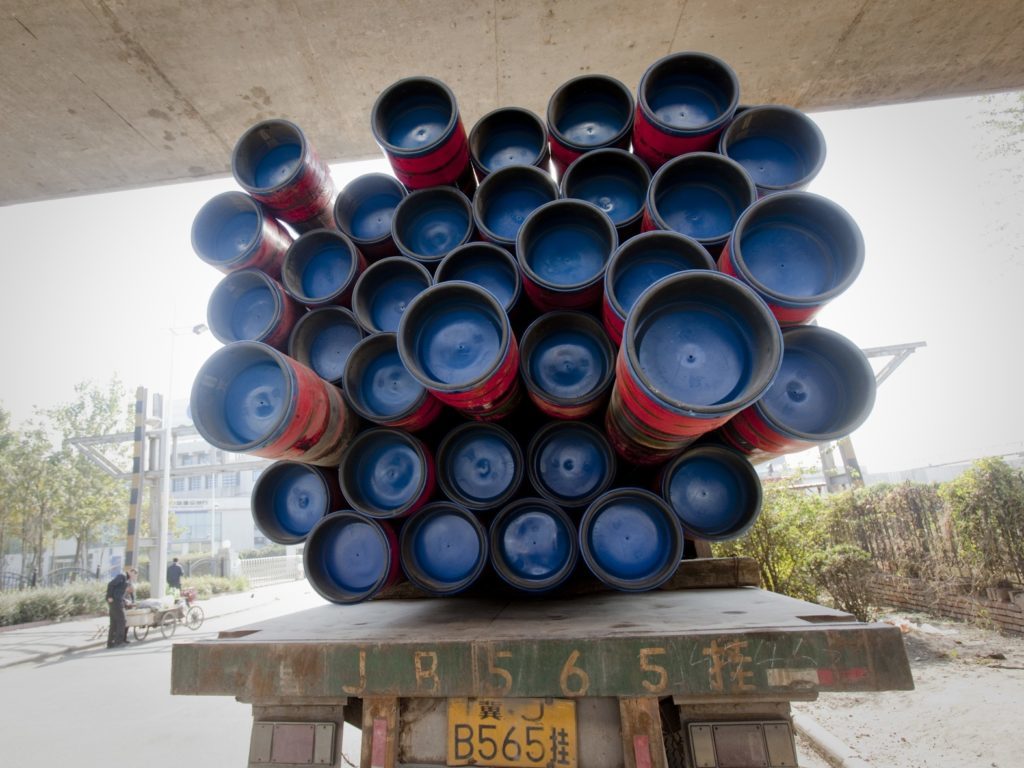
China launched its first ever crude-futures contract as the world’s biggest oil buyer seeks to wield greater power over pricing and challenge benchmarks in the U.S. and Europe.
The long-awaited yuan-denominated futures on the Shanghai International Energy Exchange traded at 432.3 yuan a barrel ($68.47) for September settlement by 11:30 a.m. local time before a midday break. Trading will resume at 1:30 p.m. The contracts, which are open to foreign investors, end years of delays and setbacks since China’s first attempt to list the securities in 1993.
September contracts of the two major dollar-based oil benchmarks, Brent in London and West Texas Intermediate in New York, traded near $68.38 a barrel and $64.06, respectively. The Chinese contract traded about $4 a barrel higher than WTI earlier in the day.
China’s desire to open a domestic market to trade futures has grown as the country’s crude imports have boomed. It last year surpassed the U.S. as the world’s biggest buyer of foreign oil. The contracts may not only help wrest some control over pricing from the main international benchmarks, but yuan-denominated contracts could also promote the use of its currency in global trade — a key long-term goal for Asia’s biggest economy.
“China has used this contract in an innovative way, to fill in the void of a voice representing buyers in Asia,” said Li Li, an analyst with Shanghai based commodities researcher ICIS-China. “With this launch, the market will pay more attention to China’s demand story.”
Futures for September settlement opened at 440 yuan a barrel, up from a reference price of 416 yuan. About 15,000 contracts had changed hands as of 11:30 a.m. local time.
Allowing foreign investors to trade the futures directly is a first for China’s commodity markets. To attract more participation, China plans to waive income taxes for overseas individuals and institutions. About 19 foreign brokers had registered to trade the contracts as of last week, the exchange said.
While the country hopes to establish a benchmark for global oil transactions, whether the Asian nation will achieve that goal has been the subject of hot debate.
Skeptics argue that hurdles such as capital controls, regulatory risk and market intervention in other Chinese securities have made investors cynical about the prospect of Shanghai futures becoming a regional price setter. Similar obstacles have kept foreign investors as bit players in the country’s giant mainland stock and bond markets. Meanwhile, crude futures that were tested in Singapore and Japan have since faded to obscurity due to low liquidity.
“It’s hard to see it becoming a major driver of oil prices in the short to medium term,” said Daniel Hynes, a senior commodities strategist at Australia & New Zealand Banking Group. “I still think there is a general reluctance from global investors to trade Chinese based contracts.”
While he’s not particularly watching it closely for the moment, ANZ’s Chinese desk is very focused on it, he said.
Then there are the bulls, such as hedge fund manager Adam Levinson, who says the start of a “petro-yuan” will be a “huge story” and increase the use of the Chinese currency in trade settlements.
For China’s regulators, the hope is that the futures will serve as a risk management tool for its oil companies, act as a price reference for industry participants, as well as help open the country’s financial markets.
With one eye on success, the authorities are also wary of any potential bubbles created by the millions of wealthy retails investors living in the world’s second-largest economy. Trading in futures from apple to steel has exploded in recent years across the nation’s three commodity exchanges, prompting regulators to repeatedly step in to quell fears of a bubble.
One way of tempering the froth has been to limit physical delivery space for the oil barrels as well as set storage costs that are double the rate elsewhere. The Chinese government would rather have a slightly slower or softer launch so it doesn’t have to intervene early on in a market that’s bubbling too quickly, said Michal Meidan, an analyst at industry consultant Energy Aspects Ltd.
Recommended for you
